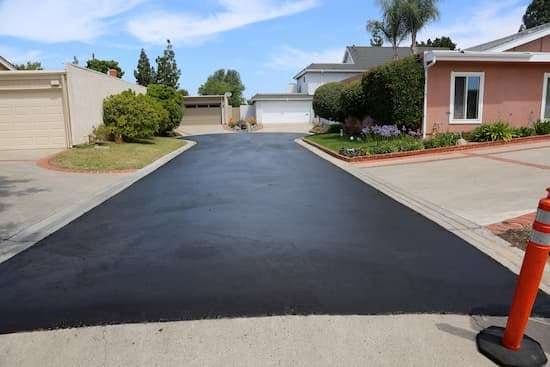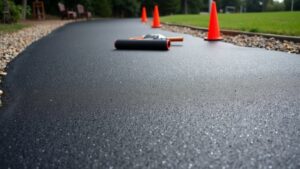Asphalt is a popular choice for driveways and parking lots because it is durable and relatively easy to install. However, one of the downsides of asphalt is that it can take a long time to dry. In some cases, it can take up to 24 – 72 hours for the asphalt to fully cure.
This can be frustrating for home and business owners who are eager to use their new driveway or parking lot. However, it is important to be patient and wait for the asphalt to dry before using it. Otherwise, you risk damaging the asphalt or causing it to degrade prematurely.
This blog post will discuss how long it takes for asphalt to dry and why you should avoid using it until it is completely cured.
What is asphalt, and why is it popular for driveways and parking lots?
Asphalt is a great choice for several reasons. First, asphalt is a relatively inexpensive material. It is also easy to install and repair, which makes it a good option for busy homeowners. Additionally, asphalt is durable and can withstand a lot of wear and tear. It is also low-maintenance, meaning that it doesn’t require much upkeep. Finally, asphalt is attractive and comes in a variety of colors. All of these factors make asphalt a popular choice for driveways and parking lots.
How Long Does It Take For Asphalt To Dry?
One of the downsides of asphalt is that it can take a long time to dry. Sometimes, it can take 24 – 72 hours for the asphalt to fully cure.
This can be frustrating for home and business owners eager to use their new driveway or parking lot. However, it is essential to be patient and wait for the asphalt to dry before using it. Otherwise, you risk damaging the asphalt or causing it to degrade prematurely.
So how long does it take for asphalt to dry? And what are some of the factors that can affect the drying time? Let’s take a closer look.
Factors That Affect Drying Time
Several factors can affect how long it takes for asphalt to dry. These include:
- The temperature and humidity levels on the day of installation
- The thickness of the layer of asphalt
- The type of asphalt mix used
- Whether or not a seal coat has been applied
Generally speaking, hot weather with low humidity levels will help speed up the drying process. Conversely, cold weather or high humidity levels can slow the drying process. Similarly, a thinner layer of asphalt will dry faster than a thicker layer. And lastly, certain types of asphalt mixes can also affect drying time. For example, mixes that contain more sand will tend to dry faster than those with more gravel.
What are the risks of using asphalt before it fully dries?
Asphalt is a material commonly used in the construction of roads and driveways. Once it is laid down, it needs time to dry and cure before it can be used.
However, there are times when asphalt may be used before it is fully dry, which can lead to several problems.
The asphalt may not harden properly, leading to cracks and potholes. In addition, the asphalt may not bond correctly with the underlying pavement, resulting in uneven surfaces.
Additionally, using asphalt before it is fully dry can release harmful fumes into the air.
For these reasons, waiting for asphalt to dry thoroughly before using it is crucial.
How can you tell if the asphalt has thoroughly dried or not?
The asphalt has to be dry before you can start to use it. There are a few ways that you can tell if the asphalt is dry or not. One way is to touch the asphalt.
If it feels dry to the touch, it is ready to be used. Another way is to look at the asphalt. It is probably still wet if it is dark, and you should not use it.
If it is a light color, then it means that it is most likely dry, and you can start using it. Lastly, you can also smell the asphalt.
If it smells strong, then that means that the asphalt is still drying, and you should not use it yet.
However, if it does not smell as strong, then that means that the asphalt is most likely dry, and you can start using it.
Three tips for avoiding damage to your driveway or parking lot while the asphalt dries
Asphalt is a popular material for driveways and parking lots because it is durable and relatively easy to maintain. However, asphalt can be damaged if it is not allowed to dry correctly after installation. Here are three tips for avoiding damage to your asphalt:
- Avoid driving or parking on the asphalt until it is completely dry. If you must drive or park on wet asphalt, go slowly to minimize the risk of tire marks or other damage.
- Keep cars and other vehicles off the asphalt as much as possible while drying. If you must park on the asphalt, use blocks or mats under your tires to distribute the weight evenly and prevent tire marks.
- Do not apply sealants or coatings to the asphalt until it has had time to cure properly. Using these materials too soon can cause them to bond poorly with the asphalt, causing peeling and flaking.
Following these tips can help ensure that your asphalt driveway or parking lot stays in good condition. Want more tips? Check out this post on asphalt maintenance.
Conclusion
Asphalt is an excellent choice for a new driveway or parking lot because it is durable and relatively easy to install. However, one downside of asphalt is that it can take up to 24 – 72 hours to dry completely.
This can be frustrating for home and business owners eager to use their new driveway or parking lot, but it is essential to be patient and wait for the asphalt to fully cure before using it. Doing so will prevent damaging the asphalt or causing premature degradation.



